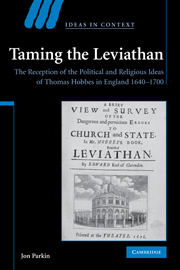 Taming the Leviathan
Taming the Leviathan Published online by Cambridge University Press: 05 May 2010
In 1640 Thomas Hobbes of Malmesbury, the 52-year-old secretary to the Earl of Devonshire, had a minor reputation as a respected translator and pastoral poet. To a small number of his friends he was also known as a promising mathematician and natural philosopher, perhaps even England's answer to Descartes. By 1700 all of this had changed. Hobbes had an international reputation, but not as an acclaimed scientist. Indeed, that reputation lay largely in ruins. He was widely known as the most notorious philosopher that England had ever produced. His name had become a byword for atheism, immorality and a whole range of unacceptable political views. To his English readers, he was the ‘Monster of Malmesbury’, the ‘Devil's Secretary’, an ‘Agent of Hell’ and as one writer put it ‘Nature's Pest’ and ‘unhappy England's Shame’. By the end of the century Hobbes had managed to acquire an extraordinary and perhaps even unique place in the English imagination as the bête noire of his age.
The remarkable transformation of Hobbes's public image from 1640 to 1700 was the effect of over fifty years of hostile commentary on Hobbes and his works. The dominant attitudes to Hobbes were largely structured by his critics, who were numerous and sometimes organised. Their success in blackening Hobbes's reputation was such that their view of the philosopher as a misanthropic atheist profoundly influenced subsequent readers and still informs popular understandings of Hobbes's ideas today.
To save this book to your Kindle, first ensure [email protected] is added to your Approved Personal Document E-mail List under your Personal Document Settings on the Manage Your Content and Devices page of your Amazon account. Then enter the ‘name’ part of your Kindle email address below. Find out more about saving to your Kindle.
Note you can select to save to either the @free.kindle.com or @kindle.com variations. ‘@free.kindle.com’ emails are free but can only be saved to your device when it is connected to wi-fi. ‘@kindle.com’ emails can be delivered even when you are not connected to wi-fi, but note that service fees apply.
Find out more about the Kindle Personal Document Service.
To save content items to your account, please confirm that you agree to abide by our usage policies. If this is the first time you use this feature, you will be asked to authorise Cambridge Core to connect with your account. Find out more about saving content to Dropbox.
To save content items to your account, please confirm that you agree to abide by our usage policies. If this is the first time you use this feature, you will be asked to authorise Cambridge Core to connect with your account. Find out more about saving content to Google Drive.